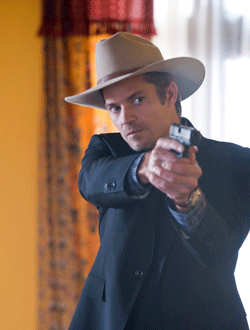Use it or drop it,” U.S. Deputy Marshal Raylan Givens calmly warns a jumpy criminal as they face off, guns drawn, on a deserted road under the blazing sun, in an early episode of FX’s new drama “Justified.”
Straight-arrow Givens (Timothy Olyphant) always offers the bad guy a choice—to leave town, drop his weapon or take his chances against Givens’s lightning-fast draw. But choices have suddenly narrowed for Givens himself, who escaped hardscrabble coal-mining, moonshining and meth-cooking in Kentucky 20 years ago, only to find himself forcibly reassigned there after shooting a Miami mobster at point-blank range (justifiably, says Givens to internal affairs and his skeptical new boss, played by a dryly bemused Nick Searcy).
Givens is perhaps the first hero—he literally wears a white hat—in FX’s pantheon of popular antiheroes (think “The Shield,” “Damages,” “Nip/Tuck” and “Rescue Me”), but he’s no one-dimensional Saturday matinee lawman. The son of a small-time con artist and an ex-con, Givens rebelled by pinning a badge on his chest, though he’s not above using skills learned at his daddy’s knee, say, to cajole a reluctant witness or cut through the white-supremacist gospel spouted by a coal-mining buddy and suspected criminal Boyd Crowder (a creepily effective Walter Goggins, who dazzled in “The Shield”).
“I think you just use the Bible to do whatever the hell you like,” Givens tells the dead-eyed Boyd over two friendly jars of hooch, severing any loyalties they may have once shared in the mines. “You like to get money and blow s--- up.”
Givens, Boyd and the others populating “Justified” are drawn from the Elmore Leonard short story “Fire in the Hole,” which provided the title, plot and verbatim chunks of dialogue for the series’ pilot episode. Fortunately, any concern that the series’ writers would not meet the challenge of replicating Leonard’s spare but revealing discourse, quirkily engaging characters, and trademark flashes of laugh-out-loud humor in the midst of sudden violence, is laid to rest in subsequent episodes that successfully weave together a “case of the week” and Givens’s web of personal entanglements.
Like it or not (and he certainly doesn’t like it), Givens’s past is catching up with him. There’s the Miami cartel gunning for revenge; his father (an oily Raymond J. Barry) looking for his next big score; a flirtatious former neighbor (Joelle Carter) fresh from killing her abusive husband (who happened to be Boyd’s brother); and, of course, an ex-wife (Natalie Zea), whose new husband may or may not be dangerously crooked. All start the ice water in Givens’s veins boiling, which keeps the series percolating nicely.
“Justified” is set in the hill country of Kentucky, where the dumb aren’t as dumb as they look (though sometimes they’re delightfully dumber); the smart are few and far between; and nearly everyone’s agenda—criminal or legit—is tripped up by the inescapable ties of shared kinship and shared hardship. But don’t be fooled by its Appalachian setting. With its laconic hero, quick-draw duels and skyrocketing body count, “Justified” is an unabashed western that pays sly tribute its 1950s film and television predecessors at every turn.
“You’re that guy who pulled a Wild Bill in Miami,” observes a Brooklyn-born informant as the new marshal enters a bar in a scene that winkingly includes a heart-of-gold saloon girl (albeit in T.G.I. Friday’s stripes instead of fishnets and feathered headdress) and a shared drink (an egg cream) to cement an uneasy alliance between lawman and outlaw. All it lacked was the squeak of swinging doors and the soft ring of spurs against a saw-dusted floor.
No discussion of "Justified" would be complete without mentioning HBO’s late, lamented “Deadwood,” which marked Olyphant’s first major exposure to a national audience. Just as “Justified” is a modern-day western, Givens is an updated version of HBO’s upright and uptight Sheriff Seth Bullock, who gave the impression that, behind Olyphant’s impenetrable black eyes and righteously clenched jaw, he could explode at any second. Givens is on a slower fuse, but Olyphant still conveys the barely contained, smoldering rage of an honest man trying to make the world a more honest place.
The supporting cast, particularly Searcy and Goggins, deliver three-dimensional and memorable performances. Quotable lines, perfectly delivered, abound. The leading female characters were initially less well developed, but later episodes expand Carter’s and Zea’s respective roles far beyond the stereotypical damsel-in-distress and exasperated ex-wife. Viewers still wait, however, for any significant insight into Givens’ fellow marshal, Rachel Brooks (a criminally underused Erica Tazel).
Unfortunately, the show’s fine acting, compelling plots and snappy dialogue are sometimes undermined by less-than-excellent production values (close your eyes during any daytime driving scenes to spare yourself some nauseating green-screen work). But now that the series is a bona fide cable hit, FX may invest more in the show’s second season.
Marshal Givens may not like the idea of being stuck in Harlan County, but after a few episodes of "Justified," there may be no place you’d rather be on Tuesday nights.









an excellent and insightful review of what is turning out to be an intriguing and entertaining series. Olyphant is right on the money with his performance and I really do enjoy the show.